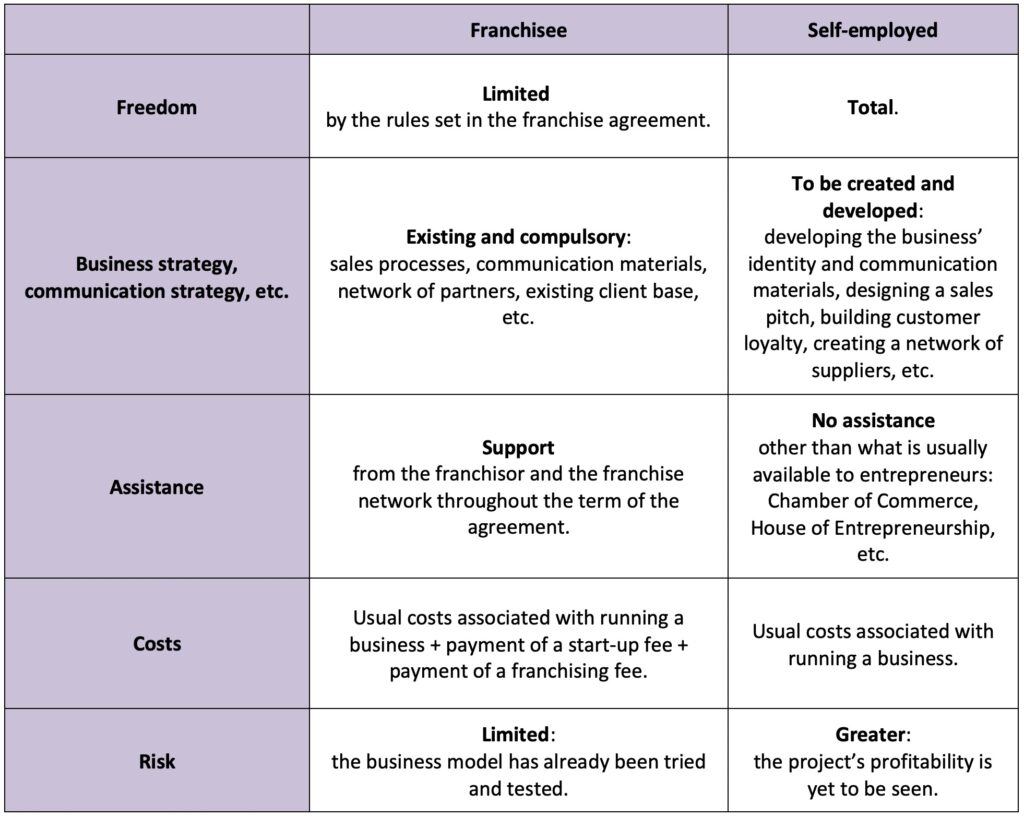Self-employment: build your own business or take on a franchise
Do you dream of starting your own company and becoming self-employed? Are you torn between the complete freedom of self-employment and the security afforded by a franchise? What are the differences between the two and what exactly do they involve?
Gabriel has always wanted to open a shop and manage his own business. But he still has reservations about striking out on his own without a safety net and wants to know more about the self-employment options available to him. He is tempted by the possibility of a franchise agreement but needs to know more before taking the plunge.
What is a franchise?
A franchise allows the franchisee to access a form of independent undertaking governed by a franchise agreement or licence with a franchisor. The franchisee can use, produce and market the products or services of an existing brand and harness its network. In exchange, they must strictly obey the rules set by the franchisor and pay it a fee.
In Luxembourg, three types of franchise exist:
-
- distribution franchise: involving the sale of the franchisor’s products;
- production franchise: involving the manufacture and sale of products according to the franchisor’s instructions;
- services franchise: involving the use of the franchisor’s trade name, brand and business model.
Although the European Franchise Federation has implemented a European code of ethics for franchising, no specific legislation applies to this type of agreement in the Grand Duchy, unlike in neighbouring countries.
Franchise-owned stores are already commonplace. Franchisees can use the brand’s existing reputation to bring in clients when they open their doors.
What are the advantages of franchises?
Limited risks
When you take on a franchise, you take on limited risk. Gabriel can use a tried-and-tested business model that works well and apply it to his shop. If he were to open a shop that was not franchise-owned, he would have to find a unique idea or a profitable business model and test it in real time, with no guarantee of success.
⇒ Banks are generally more open to granting loans when franchise agreements are involved because there is less risk than with a self-employed entrepreneur.
Existing brand reputation
Franchise-owned stores are already commonplace. Gabriel can use the brand’s existing reputation to bring in clients when he opens his doors. He will also have access to communication materials provided by the franchisor.
If Gabriel chooses to open an independent shop, he will be responsible for marketing and will need to build his business identity, put in place a communication strategy to publicise his shop, and develop customer loyalty, etc. It will therefore take longer in principle to get the business up and running than through the franchise model.
Shared expertise
As franchisors have a vested interest in the business being a success, they share their expertise and experience with their franchisees. Gabriel will therefore receive training, learn about production techniques and be trained in the brand’s sales methods. As such, he can tap into the franchisor’s experience and the entire network.
If he opts to go it alone, Gabriel will need to create the entire production process himself and put in place his own business methods.
An established network
By taking on a franchise, Gabriel will join a network that may help him to manage his business. In addition to the support dispensed when starting the company (in terms of choosing the status, designing the business plan, researching financing, picking a business location, etc.), Gabriel can obtain rates negotiated with suppliers and access a whole host of shared services: technical, legal and commercial assistance, advice on HR matters and stock management, etc.
If he chooses to manage his business alone, he will need to build his own network from the ground up, while retaining the freedom to choose his partners and suppliers.
⇒ The support granted by franchise networks obviously does not mean that entrepreneurs can be any less self-reliant or successfully run their businesses without the necessary skills: motivation, perseverance, management skills, accounting skills, business acumen, etc. They will also be solely responsible for the company from a legal and financial standpoint.

By signing a franchise agreement, franchisees undertake to strictly comply with the franchise business model and must obey the rules set by the franchisor.
What are the disadvantages of franchises?
Franchisor’s fees
To be able to use the business model and receive training and assistance from the franchise network, Gabriel must pay a fee in addition to the usual costs associated with running a shop (premises, equipment, stock, etc.).
Although the amount varies from franchise to franchise, the fees may include a start-up fee and a franchisor’s fee, which may be fixed or calculated based on turnover. Meanwhile, independent business owners aren’t required to pay these costs.
Limited independence
By signing a franchise agreement, Gabriel undertakes to strictly comply with the franchise’s business model and must obey the rules set by the franchisor. He therefore accepts to comply with the production and sales procedures, follow the brand’s sales and advertising strategy and use the network’s partners and suppliers, etc.
Entrepreneurs operating outside of a franchise are not subject to these constraints; they can manage their business as they see fit and establish their own rules in accordance with the applicable legislation.
Selling a franchise is subject to conditions
Selling a franchise is different from selling a traditional business, as the franchisee is not the owner of the brand name under which they are operating. If they want to sell the franchise, they must first have the franchisor approve their choice of buyer.
Appearances can be misleading
Just because a brand was popular a decade ago doesn’t mean its balance sheet will be just as healthy today. It is therefore important to check carefully that the franchisor’s finances are in shape before making a commitment. To do so, Gabriel can approach the franchisor directly, but he also has the option to contact other franchises in the network to find out about the company’s balance sheet, turnover, profitability, expected costs and what expertise is passed on, etc.
Franchise or no franchise: which should you choose?
Gabriel’s own objectives and personality will be the deciding factors behind whether he takes on a franchise or not. A franchise could be an appealing option for entrepreneurs who aren’t prepared to build their business from scratch, who need support or who are moving into a new industry. However, people who want to be in control from start to finish, who are well acquainted with their business sector and who want the freedom to make their own choices will benefit from total independence.
A comparison of both statuses

For Gabriel, the choice is now obvious: franchises seem to offer him guarantees and a framework that would provide him with security as he dives into the world of entrepreneurship. Although he already knows which business sector he wishes to operate in, he must think long and hard about the brand he wants to join. He can then find out more about the upfront investment, assess the profitability of the business model, consider the rules he would be required to follow and check whether any training is offered, etc.
Gabriel will soon embark on a new career that will enable him to pursue a project he’s long been dreaming about. Good luck!


 Mortgage
Mortgage Personal loan
Personal loan Savings
Savings